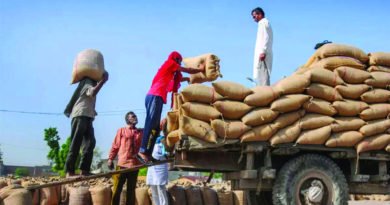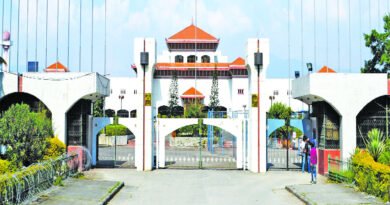No dignity of labour
Govt coldly denies compensation to dead migrants saying it doesn’t have data. Can it heartlessly ignore facts or credible media reports?
Benjamin Disraeli once said, “There are three kinds of lies: lies, damned lies and statistics.” Perhaps this is what the Government has internalised in dealing with a national crisis. Since it doesn’t believe in any kind of data collection that has not been commissioned by it, it denies that there has been any migrant death during the pandemic-induced lockdown. It doesn’t matter that its white lies are caught out by countless heart-breaking stories in the media of labourers turfed out of their city jobs overnight, forced to trudge back to their villages and without money, succumbing to hunger and illness on the way or even to destitution at their homes, without relief or dole of any kind. This denial of reality by the Government is not only brutal in its insensitivity but also a shabby disowning of its responsibility in keeping a nation together in the middle of an unprecedented crisis. Worst, its inhuman response came on the floor of the Parliament where, to a question on whether families of those who had lost their lives while trying to reach home during the lockdown had been compensated, the Union Labour Ministry put out a clinical statement that since there was no data on migrant deaths, the “question does not arise” of relief and aid. Even if one were to assume that the concerned Minister, his office and bureaucrats had for some curious reason blacked themselves out from news about India’s worst reverse migration, how does the Ministry explain its own admission that more than one crore migrants made their way back to their home States from various corners of the country? Can it blithely assume, therefore, that no hazard befell them, considering most were daily wage earners and had nothing to fall back upon? Hungry, sick and walking for days, were they in an endurance test on a reality show where their deaths could be easily dismissed as collateral damage? Is the figure not an indication of the jobs lost in the country’s largely unorganised labour market? For once, Congress leader Rahul Gandhi reacted rightly, tweeting, “If you haven’t counted, have the deaths not taken place?” Also, how can the Government discount the deaths recorded by its own Railway Ministry of the many migrants who died on Shramik trains that were organised much later to ferry them back home? Or were run over by trains as they fell asleep on tracks, exhausted and beaten? More than 1,400 road accidents killed 750 people, including 198 migrant workers, between March 25 and May 31.
Even if the Government doesn’t believe in statistics, the world does. Especially, those that come from credible organisations of long standing and which are relied upon by policy-makers themselves. The International Labour Organisation (ILO) and Asian Development Bank (ADB) have already listed that 41 lakh jobs were lost in the country during the pandemic. A World Bank report in April indicated that the livelihood of nearly 40 million internal migrants had been affected. Recently, the Centre for Monitoring India Economy (CMIE) said that five million salaried people had lost their jobs in July alone while that figure had peaked in April at 17.7 million unemployed. Further, 37.5 million students have been out of campus and are staring at a year without prospects. Without direct cash transfers, the credit-based stimulus packages, which address structural facets of the economy, have made little sense to the wage earners. A lot of them have sought refuge in the Mahatma Gandhi National Rural Employment Guarantee Act (MGNREGA), participating in schemes with a 100-day work assurance. Such is the plight that there has been a surge in enrolment with even degree holders (MA, BBA) and self-employed youth signing up for project work and digging as they have lost their jobs in the cities. About 14 crore people across the country have MGNREGA job cards. The Government will need a massive Rs 2.8 lakh crore if each card holder can get a guaranteed 100 days of work this year. Still MGNREGA, in its present form, alone cannot take care of the returning migrants unless its scope is extended to include agricultural activities. The Centre did well by raising the allocation for this scheme but a chunk of this has gone in clearing arrears. Even this financial year began with pending wage and material liabilities of Rs 16,045 crore. An allocation of Rs 1 lakh crore for FY 2020-21 would mean that Rs 84,000 crore is available for employment generation this year. Besides, even with the scheme receiving the highest allocation since it was first rolled out, it accounts for just 0.47 per cent of the GDP. This is much lower than the World Bank’s recommendation of 1.7 per cent for optimal functioning. The second challenge is of uniform implementation as States with differing priorities and machineries are entrusted with it. With fund leakages and corruption at the level of local self-Government, the scheme has gone askew in many places. There has been a consistent demand for expanding the number of work days beyond the existing 100 days but the national average number of days employed per household in the last four years has been just 47. May be this is an opportune moment to align the scheme with economic imperatives. But more needs to be done. While individual States are already setting up job portals to list returnee workers with their skill sets and allocate them appropriate work zones, this ought to be pan-India so that labour-starved States can benefit too. Till we value the labourer, recovery will be a chimera, a smart India a paper town. Besides, atmanirbharata can truly take off when we value and respect fellow human beings and not deny their existence.
Source: The Pioneer




